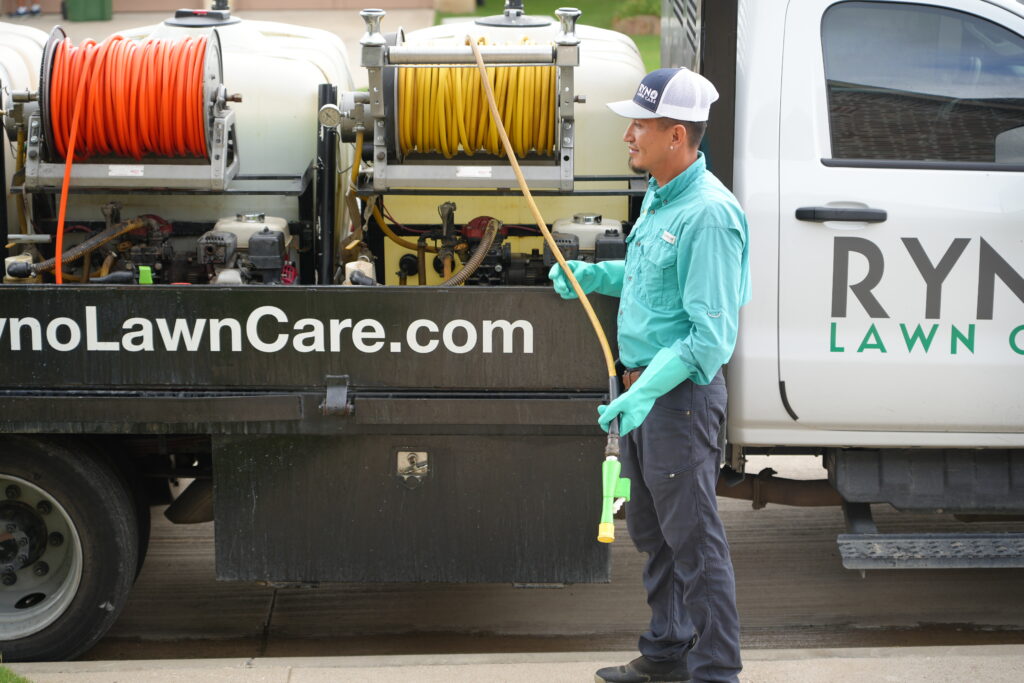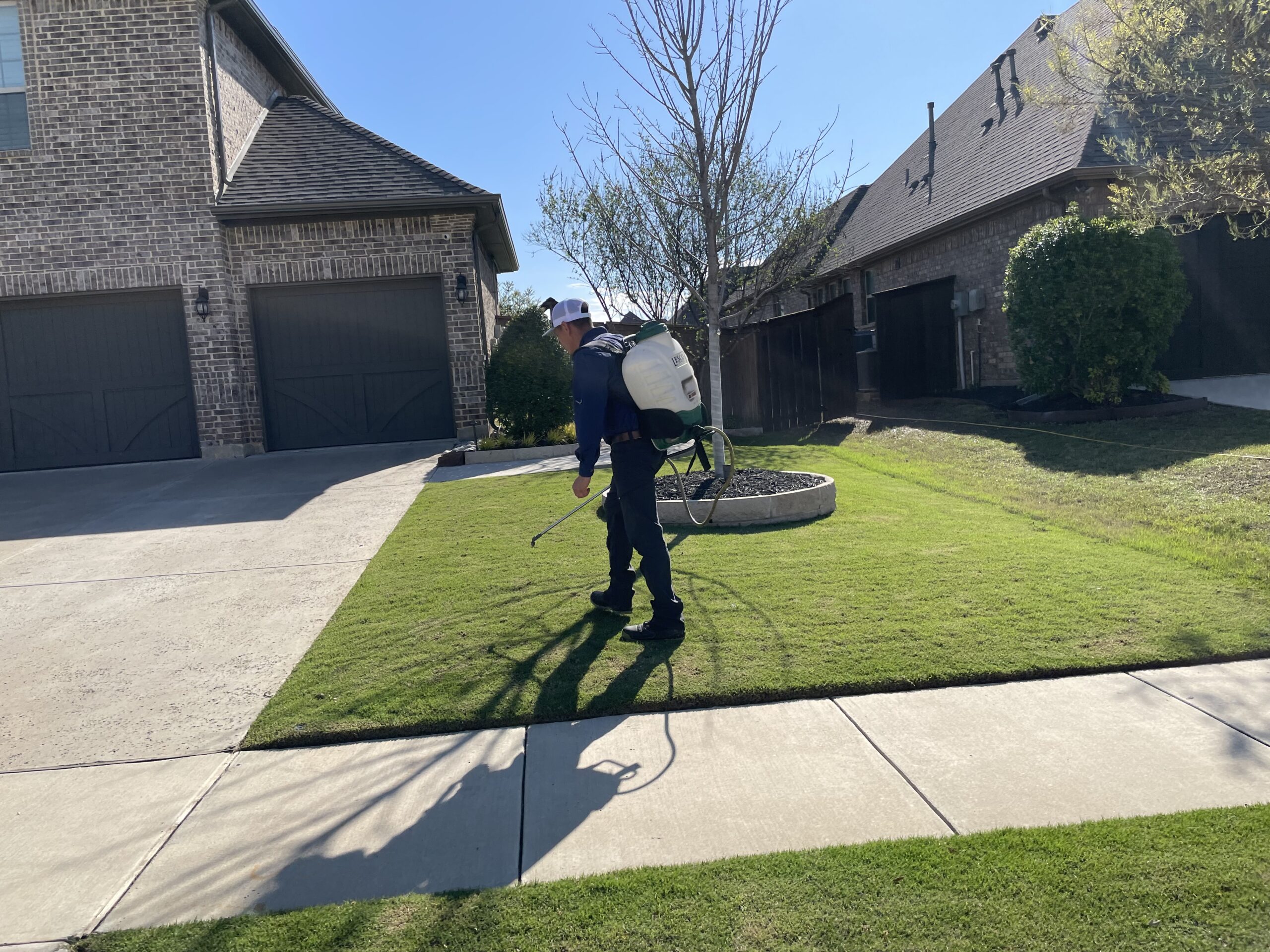If you apply the wrong type of herbicide or apply the product incorrectly, then yes, it will damage your grass and plants. Let’s dig deeper into this topic. Weed control is a crucial part of maintaining a healthy lawn. While weed control products are designed to target unwanted plants, improper use leads to unintentional damage. Here’s how to be sure your weed control efforts protect your lawn without causing harm.
Understanding Your Lawn’s Weed Control Needs

Weed control products fall into two main categories: pre-emergent and post-emergent.
- Pre-emergent herbicides prevent weeds from germinating by forming a barrier in the soil.
- Post-emergent herbicides target weeds that have already sprouted, killing them on contact or through absorption.
Both types are formulated to affect specific plant processes. This makes them effective against weeds while being safe for desired grasses and plants when used correctly.
Common Causes of Grass or Plant Damage
1. Incorrect Application Timing
Applying weed control at the wrong time will stress your lawn. For example, applying a pre-emergent too late in the season can harm newly sprouting grass seeds. Take a look at our Weed and Feed Schedule to find out when you need to be applying weed control and fertilization treatments to your lawn.
Solution:
- Follow the product’s recommended application schedule.
- Avoid applying weed control during extreme temperatures or drought conditions.
2. Wrong Product Selection
Using the wrong type of herbicide for your grass species leads to damage. Some products are selective and target specific weeds. Others are non-selective and will harm any plant they come into contact with.
UC IPM (n.d.) an herbicide will kill all susceptible plants, not just weeds. Make sure the label says it’s safe to apply on or around the other plants where you intend to use it.
Solution:
- Identify your grass type and choose a compatible herbicide.
- Read labels carefully to ensure the product targets the specific weeds in your lawn. Read our, “Lawn Weeds Identification Guide.” to figure out which weeds have invaded your lawn.
3. Overapplication
Applying too much herbicide “burns” your grass, leading to yellowing or dead patches.
Solution:
- Measure your lawn accurately and apply only the recommended amount.
- Use a spreader or sprayer for even distribution.
4. Drift and Runoff
Herbicides can drift to nearby plants or run off into flower beds during watering or rain, causing unintended damage.
Solution:
- Apply on calm days to reduce herbicide drift.
- Water your lawn carefully to prevent runoff into other areas.
Whitford and Becovitz (2021) direct exposure to pesticides is a serious matter and you should never treat it lightly. If you come in contact with a pesticide, remove your clothing and shower. Retain your clothes in a sealed bag for possible residue testing. Seek medical advice about further actions. 2. You observe distorted or discolored leaves on your trees, landscape or garden plants, or crop plants. 3. You observe spray mist moving onto your property. 4. You notice dead honeybees, dead fish, or areas where vegetation has yellowed or died suddenly.

Safe Weed Control Tips for Your Lawn
1. Spot Treat When Possible
Instead of broadcasting herbicide across your entire lawn, focus on areas with weed infestations. This minimizes the risk to surrounding grass and plants.
2. Use Organic or Natural Alternatives
Consider natural weed control options like vinegar-based sprays for a more eco-friendly approach. These are less likely to harm your grass but will require more frequent applications.
3. Consult a Professional
If you’re unsure about the right products or methods, consult with a lawn care professional, like Ryno Lawn Care. We are able to provide tailored advice based on your specific lawn conditions.
Head straight over to our Lawn Fertilization and Weed Control service page to find out more.

Conclusion
Weed control doesn’t have to come at the expense of your grass or plants. For expert advice and professional weed control services, contact Ryno Lawn Care. Our team is here to help you achieve a lush, healthy lawn all year round.
FAQ: Will Weed Killer Kill My Grass and Plants?
Q: Will using weed killer harm my grass? A: It depends on the type of weed killer you use. Selective herbicides are designed to target specific weeds without harming your grass. Non-selective herbicides, however, can kill both weeds and grass if not applied carefully.
Q: Can I apply weed killer and fertilizer at the same time? A: Yes, but it’s important to follow the instructions on both products. Some products are designed to work together, while others may require separate applications to avoid damaging your lawn.
Q: How can I prevent weed killer from damaging my plants? A: Apply weed killer on a calm day to prevent drift, and use a targeted spray nozzle to control the application area. Avoid applying near desirable plants and follow the manufacturer’s instructions closely.
Q: What should I do if my grass shows signs of damage after applying weed killer? A: Water your lawn thoroughly to dilute the chemical. Avoid mowing for a few days and consider applying a lawn repair product if necessary. If damage persists, consult a lawn care professional.
References:
UC IPM. University of California Integrated Pest Management. (n.d.). Weed control using herbicides. UC IPM. https://ipm.ucanr.edu/QT/weedcontrolcard.html
Whitford and Becovitz. (2021, April 27). Options for dealing with a pesticide drift. Purdue Pesticide Programs. https://purduelandscapereport.org/article/options-for-dealing-with-a-pesticide-drift-incident/

